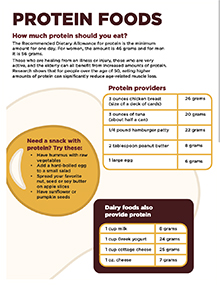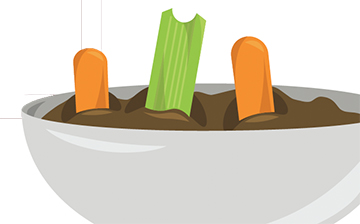Editor’s note
The following abstract describes a publication that is available as a downloadable PDF.
See the companion publication N1011, Protein poster.

Abstract
This handout provides information regarding protein in your diet.
Topics
- Daily Allowance
- Snacks
- Providers
- Recipe
- Facts
- Tips for kids
- SNAP
Pages
- 2
See handout content below.
Protein Foods
How much protein should you eat?
The Recommended Dietary Allowance for protein is the minimum
amount for one day. For women, the amount is 46 grams and for men
it is 56 grams.
Those who are healing from an illness or injury, those who are very
active, and the elderly can all benefit from increased amounts of protein.
Research shows that for people over the age of 50, eating higher
amounts of protein can significantly reduce age-related muscle loss.
Protein providers
- 3 ounces of chicken breast (size of a deck of cards): 26 grams
- 3 ounces of tuna (about half a can): 20 grams
- ¼ pound hamburger patty: 22 grams
- 2 tablespoon peanut butter: 8 grams
- 1 large egg: 6 grams
Need a snack with protein? Try these:
- Have hummus with raw vegetables.
- Add a hard-boiled egg to a small salad.
- Spread your favorite nut, seed or soy butter on apple slices.
- Have sunflower or pumpkin seeds.
Dairy foods also provide protein.
- 1 cup milk: 8 grams
- 1 cup Greek yogurt: 24 grams
- 1 cup cottage cheese: 25 grams
- 1 ounce cheese: 7 grams

Quick bean dip
Ingredients
- 15-ounce can refried beans
- ½ cup salsa
- ¼ teaspoon garlic powder (optional)
- ¼ cup shredded cheese (optional)
- Vegetable sticks or baked tortillas
Directions
- Mix refried beans and salsa in a bowl.
- If desired, add garlic powder and/or cheese.
- Serve with vegetable sticks or baked tortillas.
Why is protein important?
- Every cell in your body contains protein.
- Protein helps build and repair body cells.
- Protein provides energy.
- Protein helps build and repair muscles as well as helps your muscles contract.
- Protein plays a role in ensuring that your heart beats properly.
Do you have a child that doesn’t eat meat?
For some young children, meat is not a favorite food. It may be because it is too hard to chew or they just don’t like the texture. Offer a variety of textures of protein foods to your picky eater. Try eggs, beans, refried beans, small pieces of meat in a soup or casserole or soy, seed or nut butter.